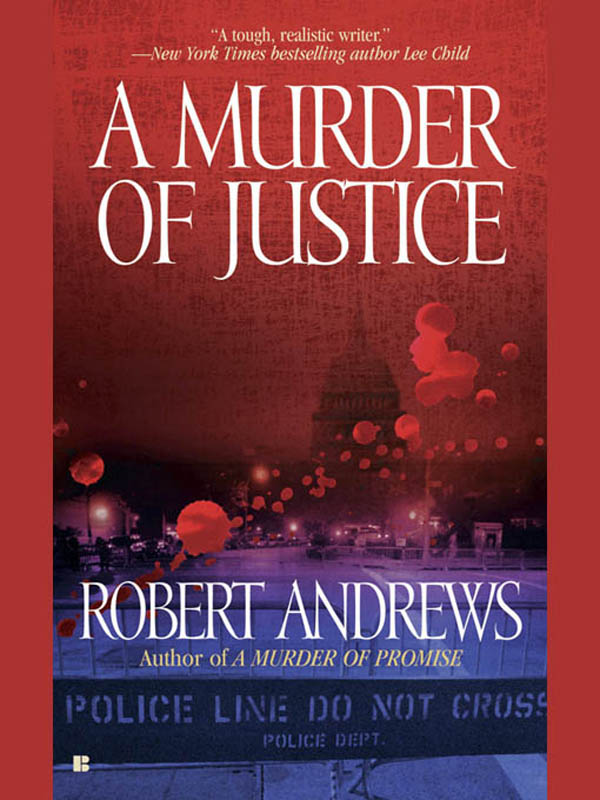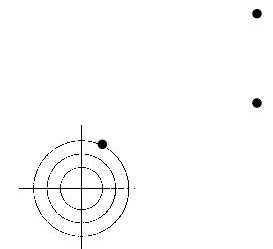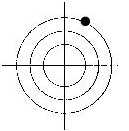A Murder of Justice
Read A Murder of Justice Online
Authors: Robert Andrews


This is a work of fiction. Names, characters, places, and incidents are either the product of the author’s imagination or are used fictitiously, and any resemblance to actual persons, living or dead, business establishments, events or locales is entirely coincidental.
A Murder of Justice
A
Berkley
Book / published by arrangement with the author
All rights reserved.
Copyright ©
2004
by
Robert Andrews
This book may not be reproduced in whole or part, by mimeograph or any other means, without permission. Making or distributing electronic copies of this book constitutes copyright infringement and could subject the infringer to criminal and civil liability.
For information address:
The Berkley Publishing Group, a division of Penguin Putnam Inc.,
375 Hudson Street, New York, New York 10014.
The Penguin Putnam Inc. World Wide Web site address is
http://www.penguinputnam.com
ISBN:
0-7865-5954-3
A
BERKLEY
BOOK®
Berkley
Books first published by The Berkley Publishing Group, a member of Penguin Putnam Inc.,
375 Hudson Street, New York, New York 10014.
BERKLEY
and the “
B
” design are trademarks belonging to Penguin Putnam Inc.
Electronic edition: August, 2005
BOOKS BY ROBERT ANDREWS
A Murder of Justice
A Murder of Honor
A Murder of Promise
The Towers
Death in a Promised Land
Last Spy Out
Center Game
Thanks to Clifford McLain, master craftsman,
who kept our roof sound, our walls solid,
and our morale intact.
FOR ANNA
T
he only affront that compares to the taking of a life is the failure of government to assure a commensurate response to murder.—District of Columbia Judiciary Committee, February 2001

APRIL 6, 2001
—a Friday. Edward Teasdale had just tilted back in his Barcalounger to watch the Orioles and Red Sox on CSN, when he heard the shots.
Bam. . .Bam. . .Bam. . .Bam. . .
Steady shooting
.
Bam. . .Bam. . .Bam. . .
Silence.
Teasdale waited. No more shots.
Bayless Place in southeast Washington, D.C., used to be a quiet neighborhood. But in the last several years, Teasdale and his neighbors had gotten practice at what he sourly called “acoustical gunfire analysis.”
This evening’s shots had been evenly spaced.
One shooter. Somebody out there on the street wasn’t in a hurry.
Seven shots, maybe eight.
Not a revolver. An automatic—probably a nine
.
Teasdale glanced at the digital clock on the TV—seven thirty-two. He went to the window and pulled the curtain
open just enough to get a glimpse of the street, then settled back into the Barcalounger.
Jason Johnson took the mound against Boston.
The day before, Hideo Nomo had thrown a no-hitter for the Sox against Teasdale’s beloved Birds. Tonight, Teasdale wanted revenge.
The clock showed seven thirty-eight. Johnson had struck out the inning’s second batter . . . no further gunfire outside. Teasdale grudgingly lifted himself out of the Barcalounger.
Might ’s well take a look
.
Standing off to the side, he unbolted and opened his front door. It was sunset. The sidewalks were deserted. Anyone who’d been outside had long before taken cover. The dark Ford Taurus was parked about halfway down the block in its usual place. Rhythmic bass thumps of a stereo driving at top volume rocked the air.
The sidewalks were still empty when Teasdale got to the car. In the street, glass nuggets glowed in the sun’s last light. Bullet holes dimpled the door. Skirting the back of the car, Teasdale peered through the shattered window.
Blood darkened the windshield and dashboard. A Puff Daddy rap thundered from the Taurus’s speakers.
Off to his right, Teasdale caught the brassy glint of empty cartridge cases on the asphalt. Here’s where the shooting had been done, right here where he was standing, Teasdale figured. He aimed a finger pistol.
Bam . . . Bam . . . Bam . . . Just like that
.
Teasdale circled around to get a more direct look into the front seat.
“Why, hello, Skeeter,” Teasdale whispered.
The top of James “Skeeter” Hodges’s head had been blown away.
Teasdale smiled.
Another figure slumped in the passenger seat. Tobias “Pencil” Crawfurd, Skeeter’s number two, was breathing.
Teasdale frowned. He waited a moment.
But Crawfurd kept breathing.
Teasdale sighed.
Inside his house again, he dialed 911. Finished with the call, he settled back to watch the game. Things were getting better. The Orioles were up by one.
“Oh, yes,” Teasdale whispered into the empty room. He smiled.
Ten minutes passed before Officers Antwon Hawkins and Samuel Lawson responded, got Crawfurd on his way to the Hospital Center, and secured the crime scene.
Five minutes later, District of Columbia Metropolitan Police Department homicide detectives Frank Kearney and José Phelps arrived.
 ONE
ONEF
unny,” José said.
“Funny funny?”
“Strange funny.” José pointed through the windshield. “No spectators.”
Ahead, on Bayless Place, an ambulance and three squad cars, light bars blazing blues and reds, yellow crime-scene tape, and flares like fireballs framed a Taurus with shot-out windows. A regular circus. A sure-fire crowd-draw anywhere.
Frank felt his gut go heavy. He’d seen violent death, some of it in wholesale lots. He’d never gotten used to it. But he’d learned to wall it off. He’d kept the wall in good repair. Through Vietnam, through the years on the force, the wall had shielded him from the soul-searing exhibits of the horrific things people did to one another. Lately, though, it seemed too much was getting through. Too much was following him home.
He pulled over to the curb. He and José got out and walked toward the lights and the Notorious B.I.G. rap blaring from the Taurus.
At six-two, Frank was an inch shorter than José, and at one-ninety, thirty pounds lighter. Frank had run track and cross-country at the University of Maryland. José had played football at Howard, switching in his junior year to boxing. They’d been together on the force for twenty-six years. Roommates at the academy, beat cops in every tough neighborhood in the District, and now plainclothes in Homicide.
But the years had done more than produce the force’s two most senior detectives. Their off-duty lives had intersected and intertwined. The two men had supported each other through private triumphs and personal trials, through marriages and children, divorces and deaths. Years passed, and each became as comfortable with the other as he was with his own shadow.
One of the uniformed officers turned. Frank recognized Antwon Hawkins.
Hawkins walked toward them with the rolling swagger of a sailor on shore leave. One hand thumb-hooked over his pistol belt, he tossed José a casual salute with the other.
“Ho-zay can you see?” he singsonged.
José pointed at the car. “Who was that?”
“None other than the newly dead Skeeter Hodges.”
As they walked to the car, Frank felt the heaviness ease. “Somebody finally got him?”
“Pretty good. Pencil Crawfurd was sitting in front with him.”
“He get it too?” José asked.
Hawkins shook his head and frowned in disappointment. “Sam and I get here, he was unconscious. Looks like he took at least one in the shoulder. Hard to be in that car anywhere and not get one. We found eight shells . . . nine-millimeter.”
“Where is he?”
“Hospital Center.”
At the car, Hawkins pointed to the body slumped forward over the steering wheel. He turned his flashlight on the dead man. The top of the skull was missing. Contents of the brain pan were splattered on the dash and windshield.
Death smell, metallic like that of damp copper, radiated from inside the car. Frank exhaled through his nostrils. When he had to, he inhaled through his mouth, keeping it shallow. It didn’t do any good. He’d known it wouldn’t, but he did it anyway.
“Head shot at close range.”
Frank felt in his chest the vibrations of Notorious B.I.G. going on about big booty bitches, and he reached in and jabbed at buttons until the CD player turned off and B.I.G. vanished in the middle of a “ ’ho.”
“Who was the nine-one-one?” José asked.
Hawkins checked his notebook. “Teasdale.” He spelled the name. “Lives over there.” He pointed to a small brick bungalow halfway down the block.
F
rank felt somewhat better walking away, putting the crime scene behind him.
“Skeeter finally got a dose of what he’s been giving out,” José said.
“Surprised somebody didn’t do it sooner.”
Closing the case might not be too hard, Frank half reasoned, half hoped.
Somebody out there somewhere. Still on an adrenaline rush, pupils dilated with excitement. King of the world. Immortal. Invincible. Absolutely bulletproof. And they’d talk. Absolutely had to talk. Because they wouldn’t get credit for the score, for taking down Skeeter Hodges, unless people knew they’d done it.
A porch crossed the front of the Teasdale house. From the porch, four rocking chairs surveyed a tiny but well-kept yard guarded by a chain-link fence.
Frank rang the doorbell. From where he stood, he could see Skeeter Hodges’s car. The ambulance and the patrol cars were still there, and the flares still guttering, and still no rubbernecking crowd. The door opened a crack.
“Police,” Frank said, flashing his badge. The door
closed. He heard the rattle of one chain lock being undone, then a second. The door opened.
Large man. Mahogany skin. Thick black mustache. Prominent, suspicious eyes. Orange and black Orioles cap, bill to the front. A sweater buttoned snugly across a heavy gut.
“In here.”
Teasdale led Frank and José through the living room to a dining alcove. No woman around, Frank decided. No plants, pleats, or patterned fabrics. All straight lines, solid colors, and sturdy furniture. It was barracks neat, the way a meat-and-potatoes man would keep things. In the alcove, Teasdale took a chair on one side of the small table and motioned the detectives to chairs on the other side.
Frank and José sat down.
José started the questions, Frank took notes.
Teasdale was Edward Everett Teasdale. Sixty-one. District native. Four-year enlistment in the Air Force, service in Germany. Retired Metrobus driver. Spouse deceased. Lived on Bayless Place for the last thirty-six years.
“Tell us what happened this evening,” José said.
Teasdale told his story in short, unadorned sentences. He told it methodically. A bus driver making all the stops. He finished and sat, hands folded on the table, looking at José and Frank.
Frank went first. “So you heard the shots at seven thirty-two.”
“Jason was warming up.”
“You heard shots, but you didn’t go outside for five minutes.”
“Six.”
“What?”
“
Six minutes.
Didn’t go out for six minutes. Waited till Jason put down the second batter.”
“Okay, six minutes. Why’d you wait? . . . Besides wanting to see Jason, of course.”
Teasdale gave Frank, then José, a long, disbelieving
look. He frowned, a man who knew that there were such things as stupid questions.
“You live ’round here, and the shooting starts,” he said patiently, as though explaining to a child, “you don’t go sticking your damn-fool head out your door.”
“You knew it was James Hodges?” José asked. “When you looked in the car? How’s that?”
Teasdale’s eyes rolled at another stupid question. “It was his car,” he said, again slowly, patiently. “It was where he always parked. Him and his buddy, that skinny bastard Pencil. Drive up every evening. Sit there for an hour, maybe two. That’s how I know.”
“They doing any business?”
“Not here. They just sit there.” Teasdale’s eyes narrowed. “Letting us know.”
“Know? . . . Know
what
?”
Teasdale took a deep breath. “That Bayless Place was his.”
“Why’d he have to prove that?” José asked.
“He just comes around. Sits there, just letting us know.”
“When’d he move in?”
“February . . . no, March.”
“You see anybody in the street before the shooting?” Frank asked.
“Like I told you,” Teasdale said evenly, “before, I was watching the Birds. And after, I was watching the Birds. When Jason put down the second man up, that’s when I went out. The street was empty. Nobody there. Nobody.”
“You know anybody who’d want Skeeter dead?” Frank asked.
Teasdale half laughed. “Pick a page in the phone book.”
It got quiet in the house as he looked steadily at Frank.
“Somebody’s goin’ to take his place, you know.” Reproach was a knife in Teasdale’s voice. “It’s the way it’s gotten to be around here.” He swung his head back and forth. “Isn’t one bunch of gang-bangers, it’s gonna be another.”
B
ack on the street, Frank saw a dark gray Jaguar parked beside the ambulance at the crime scene. As they got closer, he spotted Anthony Upton, the medical examiner. A tall, angular man, Upton was directing technicians to position a folding gurney by the Taurus’s open driver’s-side door.
“Nice night, Tony,” Frank said.
Upton looked around and smiled.
Frank avoided looking into the car. Even so, the blood-copper smell reached out for him.
“Messy,” he said.
As if it’s ever neat.
He said it to have something to say, because if he didn’t, he’d have to take another look inside.
“Shooter shot through the closed window,” Upton said. “Slugs carried a lot of glass in with them.”
“You see his buddy?”
Upton dismissed the question with a shrug. “He was alive.”
“Restricted clientele?”
Upton nodded. “I got enough business with the dead ones, Frank.”
Two techs had the white plastic body bag open on the gurney beside the car. The bigger tech reached in and easily lifted Hodges by the shoulders. He had the corpse halfway out of the car when his smooth motion jerked to a stop.
“Foot’s caught,” Upton said.
The tech heaved.
Frank heard a splintering snap. The tech stumbled back, the corpse in his arms trailing blood and brains.
“Muthafucka,” the tech muttered. He recovered his footing. In a graceful ballroom maneuver, he swung and dipped, dropping his partner onto the gurney, faceup. Everything above the eyebrows was missing. Beneath the dark cavity, the eyes and mouth were wide open.
“Surprised, Skeeter?” José asked.
“Slugs exited the front,” Upton said. “Probably somewhere inside the car.”
J
osé sat in the driver’s seat, slapping the wheel in a slow funereal beat.
Upton had left in his Jag, following the meat wagon. He and Frank had inventoried, photographed, measured and sketched, and scoured the area for evidence, and an hour later, they were watching the forensic techs wrapping up the crime scene. The department wrecker was hooking up the Taurus. Tomorrow, all that’d be left would be glass on the street from the shot-up car. The glass would stay awhile, but eventually it would be gone too.
“Teasdale was right, you know,” José said, still looking at the glass. He heard Frank say something in reply, but not exactly what. José surveyed the small houses with their neat yards that lined Bayless Place.
Once you had your street taken over by assholes like Skeeter, you were in for trouble. Even if you got rid of Skeeter, the damage was done. He had shown that Bayless Place could be had. Blood in the water. And there was always somebody else out there, circling, watching, searching out the cripples, the easy pickings. That’s why Teasdale had seemed so angry. Teasdale knew what would come next. What for certain would come next.
José felt a weighted despair. Getting looked at that way went with the job. They pay you to be the thin blue line between society and the animals. But the Skeeters roamed free and the Edward Everett Teasdales stayed off the streets and made sure they locked their doors.
“You ready to go?” José asked Frank.
H
e’ll live. He might not be able to do anything useful with that left arm, but I suspect he wasn’t trying out for Olympics gymnastics before he was shot.”
Dr. Sheresa Arrowsmith, a stocky woman with a glossy ebony complexion, was an expert on gunshot wounds. “Didn’t plan it that way,” she’d explained to Frank and José when they had met her years before, “but you work trauma in the District, you get a lot of practice digging out slugs.”
“Officer on the scene said it looked like he took it in the shoulder.”
Arrowsmith nodded. “He did. But the bullet was tumbling when it hit him. It may have ricocheted off something in the car . . . may have been one that went through his friend’s head.”
The three began walking toward Intensive Care.
“He’d have been better off if it had hit him full force,” Arrowsmith continued. “Would have drilled right on through the shoulder. Tumbling like it did”—she made a circling motion with an index finger—“it pretty much smashed up the rotator cuff.”